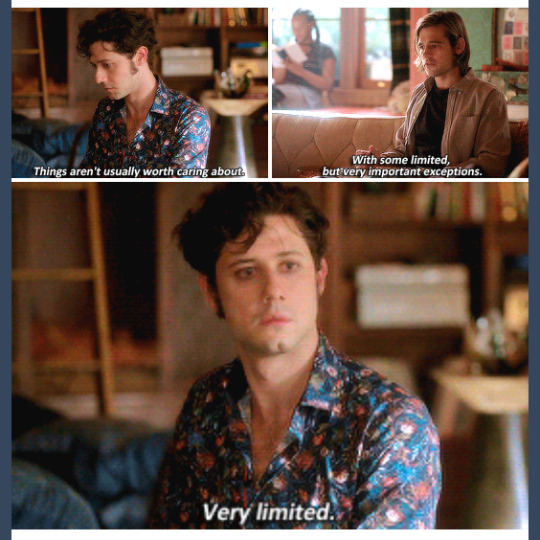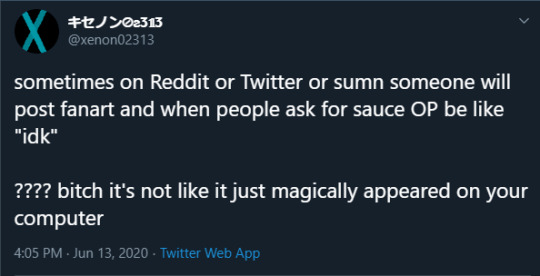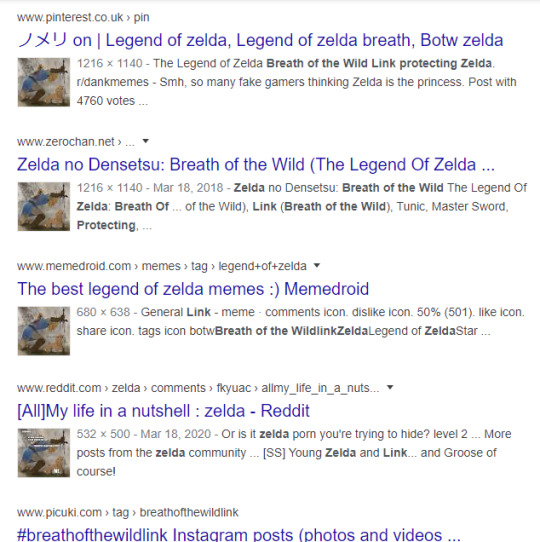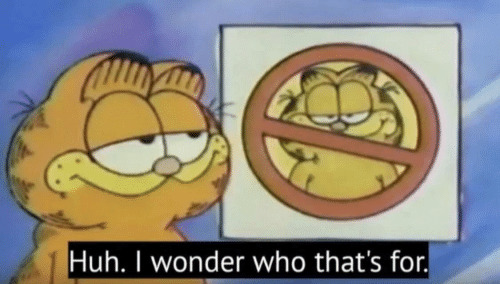#and the worst thing is that reposters usually have the nerve to get offended when called out
Text
Tutorial: How to recognize stolen gifs
Since apparently this is a plague of every fandom that has been recently hitting hard on The Magicians’ fandom, @jlarinda suggested I should make a tutorial under the motto: pls stop giving notes to stolen shit.
Gif making takes a lot of time. Between getting the episodes, getting the caps, cropping, coloring, and that’s without keeping in mind the time it takes to learn all that stuff. So when you see your stuff or someone elses reposted? It fucking sucks. But sometimes people might not realize that something they reblogged is stolen, because that’s mostly on the poster’s fault, so here are some tips to recognize reposters so ya’ll don’t accidentally feed the stealing monster.
1) Gif placement

This is a repost of this gifset and the first thing that should catch your attention is the gifs distribution. People, more often than not, follow templates when deciding the size and number of gifs they make. The fact that the first two gifs, when put on the same line, look the same size and not resized by Tumblr is your first hint, since reposters more often than not don’t care about that. Also if the placement doesn’t make sense (the dialogue is in the wrong order, for example) that’s also a hint.
2) Tags
While gifmakers make gifs because we like them, we also like getting notes and recognition from our stuff. Which means we know which tags to use to get our gifs noticed and to mark them as our own, most times so that people can go into our blogs and easily find what we make through tags. Reposters lack these tagging systems.

This picture above, for example, are the tags on the repost mentioned above. Now compare that to the tags on a gifset I made:

Ramblings on the tags aside, the first thing that should catch your attention is the tag themagiciansedit. Gifs and edits from any show are usually cataloged under “shownameedit” tag, for easier finding. Most, if not all the people who make gifs, know about this and use this tag. Also, like I mentioned before, I mark my gifs as mine: gif, but everyone has their own tagging system. Not seeing something like that on the tags is usually a red sign.
3) Still images with text
Probably one of the most obvious forms of reposting. Gifs are usually colored, and they have text and size that are easily recognized. Plus, when you take a screencap of a gif and reupload it, the quality lowers a lot. So if you see a colage of still images, with coloring, and subtitles? It’s probably a repost.
4) Reverse Google Image Search
If none of this things apply but you still wonder if a gif is reposted or not, right click on the image and then select Reverse Google Image Search. If the gif has been posted before, Google will show you where. Bear in mind that sometimes it might not pick up the gif in question, so if the post has multiple ones you should check until you get a hit.
This is also the fastest way to find the original source, so use it to your advantage! Especially if you likef the gifset and want to give the notes to the original creator.
Also, don’t be shy about contacting the creators with the link to the repost, so they can report the post and have it taken down.
Thank you for taking the time to read this! Gifs gets stolen a lot, not only here but on twitter and instagram too. So if you see someone stealing gifs somewhere, don’t be shy and call them out, tell them that what they are doing is wrong. It’s very discouraging for people who take the time to make gifs and edits to see their things reposted.
#the magicians#gif making#gifs#tutorial#mine: tutorial#also my salt#i am so tired of seeing things reposted#and the worst thing is that reposters usually have the nerve to get offended when called out#so yeah#stop reposting
181 notes
·
View notes
Text
Western social media has no respect for Japanese online artists - and it’s killing online art
The visual arts have evolved to suit the most popular medium of each era. In nowadays’ case, the internet is the go-to method of sharing the fruits of one’s labour). However, as stated in that tweet thread of mine you can see if you scroll down a bit (assuming you’re viewing this post on chariot313.tumblr.com) different cultures have different attitudes towards how their customers react to their products. This include you know what fuck the formalities, I’ll just say it: The exclusively western concept of someone seeing something they like online and hitting the share button to stimulate the “Haha, upvotes go ‘brrr’!” dopamine in their smooth-ass lizard brain will be the death of online Japanese artists. Or rather, it has been already, and you would know that if you’ve ever seen an artist’s Twitter bio be in mostly Japanese save for one sentence in English; “Reprint is prohibited.”.
If you want to hear me rationalize the absurd claim I just made, feel free to click the “Keep reading” button. Otherwise, turn back now and save yourself from me possibly wasting your time.
Alright, you’ve chosen to stick with me. Just remember, you asked for this.
Introduction
Social media as a whole is based around sharing (posting, uploading, submitting, tweeting, blogging, streaming etc.) and other’s reactions to what one has shared (views, likes, subscribers, favorites, followers, upvotes, retweets, reblogs, crossposts, etc.).
However, miscommunication and culture shock due to language barriers and cultural differences is one of the many factors that can negatively affect one’s experience on social media. For example, the Japanese artist community, active on sites such as Twitter, Pixiv, NicoNico Seiga, FC2 blogs, etc.. Twitter is mostly inhabited by English-speaking users. Here in the west, our main motive for sharing something on social media (such as art) is for fame and recognition. However, over in the East, most online artists only upload their works to the internet for personal use. I’m not saying one cultural attitude towards sharing art is better than one another, but when these two worldviews collide, the culture shock can negatively affect the careers of artists who are unaware of the other culture’s differing views on sharing art.
So, I’ve listed numerous social media platforms below and I’m going to elaborate on how each of them contributes to the alienation and discouragement of Japanese artists.
DO NOT WITCH-HUNT OR HARASS THE CULPRITS I’VE LISTED AS EXAMPLES; THEY ONLY SERVE TO BACK UP MY ARGUMENT
Twitter
Go into the twitter search bar and type in the name of an anime character (usually female). What do you find? Most likely an account named after said character that does nothing but post unsourced fan art of said character with cheesy “in-character” captions on them.
Exhibit A [NSFW]
Exhibit B [NSFW]
Exhibit C [very NSFW]
Aside from that, Twitter isn’t that bad in this regard, as a lot of the art that gets stolen is originally uploaded to Twitter anyway. But I’m just getting started.
Wattpad
Ah yes, Wattpad. One of the “trinity” of fan fiction communities (the others being fanfiction.net and AO³), featuring many different stories with varying degrees of readability. The problem is the option to add a picture to adorn your fanfiction, at which point most of the authors google “<fanfic subject> fan art” and use something from there without considering the repercussions. This causes Wattpad to be one of the top results when reverse image searching to find the source of some fan art, aside from another site I’ll mention later on...
Reddit
There’s a subreddit I often browse called r/ChurchOfJirou, a community for sharing anything relating to the character Kyouka from My Hero Academia (I mean come on, she’s like the cutest thing ever). A lot of the posts on that sub are sharing fan art of the aforementioned character. One of the rules in the sidebar is “always include the source in the title or the comments”. And most of the submissions make good on that rule. However, a lot of the posts are from Japanese artists on Twitter or Pixiv, and following the source link leads you to find the artist’s bio, which usually has something along the lines of “don’t repost my work”. And what’s more, the biggest offenders (of submitting art to the sub without OP’s permission) were the moderators of the subreddit. You know, the ones who are supposed to be enforcing the rules? I even got so fed up that I called it out, to which one of the mods replied,
“It doesn’t really make a difference, does it?”
Luckily, not all subreddits are like this. For example, other MHA-related subs like r/BokuNoShipAcademia or r/ChurchOfMinaAshido have moderators that are more considerate of artists’ wishes. Overall, Reddit is usually a hit-or-miss when it comes to this kind of thing. At best, you’ve got subs like the two I just mentioned which make sure to respect artists, and at worst you’ve got people trying (and failing) to edit out watermarks. Also, not to self-promote, but this tweet of mine represents this situation pretty well:

Imgur
Imgur isn’t that bad compared to the rest of these, but it’s a common one that people link to when asked for the source of whatever they’ve shared on Twitter or Reddit or whatever.
Amino Apps
Amino Apps is a strange case. I don’t know much about it since I’ve never used it, but from what I do know it seems similar to Reddit in that there are numerous communities for different niches. That said, judging from the way it clogs up Google image search results, I doubt OC art is posted there often.
YouTube
Now, you may be thinking, “How does a video site rip off others’ art?”. The answer is uploads of soundtracks. Look for any OST from a video game or anime on YouTube and the picture used for the video will likely be some fan art by a Japanese Pixiv artist, usually one that forbids reposts of their work. Not only that, but if the uploader did bother to add the source in the description, it’s usually not even a link to the actual source, more likely a link to Zerochan or Pinterest or something. Now take into account that some of these videos get millions of views. Imagine working hard on something, and some numbnuts takes it, slaps some music onto it, uploads it to YouTube, and gets millions of views while you get next to nothing in comparison.
Exhibit A
Exhibit B (re-upload; original had nearly 40 million views before it was copyright claimed)
Exhibit C
and many many others
Pinterest
Alright, this is the big one. When Pinterest isn’t giving recipes or wardrobe ideas to suburban white moms, it’s clogging up Google reverse image search, punishing anyone who just wanted to find the source of some cute fan art. I feel like this meme by ZebitasMartinexSi on Facebook sums it up:

For example, this piece of Legend of Zelda art by Twitter artist @_nomeri_ (I’ll just link to it, since it would be hypocritical of me to embed the image even though @_nomeri_’s bio warns people not to repost their art). Good art, right? Well, if you right-click and hit “Search Google for image”...

...yeah. Pinterest is a plague. It thrives on theft. Even worse is when someone will post fan art on Twitter/Tumblr/Reddit/etc. and have the nerve to say “IDK the source I found it on Pinterest ^_^”. Or worse yet, they link to Pinterest saying it’s the source.
Instagram
While many other sites rag on Instagram for its reposting of memes, it’s no better when it comes to reposting fan art, especially from Pixiv. I’ve seen lots of stolen pieces with fan fictions written in the description. Personally, if I were an artist, I’d rethink my career choice if I saw my art reposted on Instagram with a half-assed fanfic under it, so I don’t blame Japanese artists who close their Pixiv accounts after seeing that. But that doesn’t mean we shouldn’t try to prevent it from happening in the first place.
DeviantArt
DeviantArt is more “renowned” across the web for its niche circles of bizarre fetish art, but in its defence, there are some legitimately good pieces on there. If you do find a good one though, try checking to see if all of the uploader’s pieces have a similar overall art style, because if not, that’s a sure sign of someone passing off some Pixiv user’s art as their own, which is unfortunately fairly common on DeviantArt.
9Gag
Not a whole lot to say about 9Gag. I mean, it does contribute to reposting of art, but nothing really separates it from the others on this list, aside from its watermarks. At least the watermark gives away the fact that something was reposted.
Know Your Meme
You know that Zelda pic by @_nomeri_ I was talking about earlier? Well, to add insult to injury, it became an object-labelling meme.

Imagine putting hours into something and politely asking others not to repost it, only to find that some nincompoops on r/DankMemes made it into an object-labelling meme.
But this isn’t KYM’s fault, per se. Know Your Meme only documents memes; they do not create them. However, as someone who regularly browses the Know Your Meme image galleries, I can say that the image gallery has essentially become Know Your Fan Art (unlawfully reposted fan art, that is).
Redbubble
There’s an NSFW artist I follow on Twitter by the name of Nico-Mo. A while ago, his Pixiv account was suspended, and there were numerous pictures on there that he had not uploaded to his Twitter or DeviantArt, so I found a mirror of one of those pieces on Gelbooru and reverse-image searched in hopes of finding it on his Twitter. No such luck. What came up instead was a .png of the piece made into a sticker being sold on Redbubble. In fact, that’s one of the major reasons why artists disapprove of their art being reposted, as it may find its way onto a sticker or a T-shirt being sold as merch without the original artist giving consent nor the artist receiving so much as a single nickel.
Facebook
Surprisingly, I think Facebook is one of the least offending sites on this list. Still worth mentioning, though.
Funnyjunk
Like Imgur, Funnyjunk isn’t that bad compared to some of the rest of these, but this exchange in the comments of a repost of an MHA artist that deleted their account (not hard to see why considering people straight-up ignored the big-ass watermark at the bottom) is proof enough of western social media’s flippant attitude towards ruining online artists’ careers.
Aggregator imageboards such as Yande.re, Konachan, Danbooru, Gelbooru, Rule34, SankakuComplex, Zerochan, etc.
I don’t think I need to explain these. But like Imgur, these are what most people link to when asked for source instead of bothering to find the original post.

We Heart It
I don’t know much about “We Heart It”, but it seems to be a “Pinterest Lite” considering it clogs up image search almost as much as Pinterest does.
iFunny
Basically the same as 9Gag, in the sense that its watermarks are a dead giveaway.

4chan
I’m not sure if 4chan really “counts” among these, as it’s a chat board where nearly everything is impermanent anyway. However, I was once on an NSFW subreddit where one submitter used a 4chan thread to get Patreon-exclusive material from an artist to upload to the sub (even though one of the rules of the sub was “no paywall content”), so that alone earns 4chan its spot on this list.
Tumblr
Yes, not even Tumblr is innocent. Although I’m sure you knew that. Similar to what I said about Twitter, look up any blog named after a fictional character and it’ll likely be chock-full of unsourced fan art.
“Why is this even important?”
Because if an artist sees that their work is being reposted, depending on the artist, they may delete the original post when they wouldn’t have to if people had just respected their wishes. Now, if an artist wants their works gone from the internet for other personal reasons, that’s up to them and we should respect them for it. But artists taking down their works due to mass reposting is 100% preventable, which is why it’s sad. If you don’t respect an artist, they won’t create art. Simple as that.
“Why do you care so much?”
Eh, I’m just weird like that. It just ticks me off when anything online, whether it be art, or a video, or whatever, is lost. In my opinion, nothing hurts more than clicking a Pixiv link on an imageboard and being greeted with “The work was deleted or the ID does not exist.”.

“But lots of western artists forbid reposting of their art too!”
Indeed, that is correct. But while many artists of every nationality and culture frown upon reproduction of their work, it seems only western social media is responsible for reposting art in the first place. I mean, why else do you think Japanese artists are saying “Reprint is prohibited” in English when the rest of their bio is in Japanese? Because English-speakers are the ones reposting.

“But exposure can help an artist!”
Yeah, that’s true...
...but “exposure” doesn’t mean much if those “exposed” to one’s work don’t know or care who it came from.
And if you need even more reasons, look no further than these posts about the same topic by other blogs:
https://cranberrywitch.tumblr.com/post/143456002228/stop-reposting-art-from-japanese-artists
https://thegospelofnagisa.tumblr.com/post/143308182398
https://edendaphne.tumblr.com/post/163117317030/ive-been-wanting-to-make-this-educational-cheat
https://marklightgreatsword.tumblr.com/post/190056977650/discourage-art-theft-in-fandom-in-2020-dont
https://letusrespectpixivartistconsent.tumblr.com/post/92189994896/why-is-this-important
also, not to self-promote but I made a thread on Twitter on this topic about a month ago that you can check out here.
That’s all.
posted Jun 14; last edit Jun 21
#art theft#pinterest#rant#essay...?#soapbox#pixiv#twitter#tumblr#respect artists#deviantart#instagram#weheartit#aminoapps#know your meme#reddit#western#japanese#art#artists#imageboards
1 note
·
View note